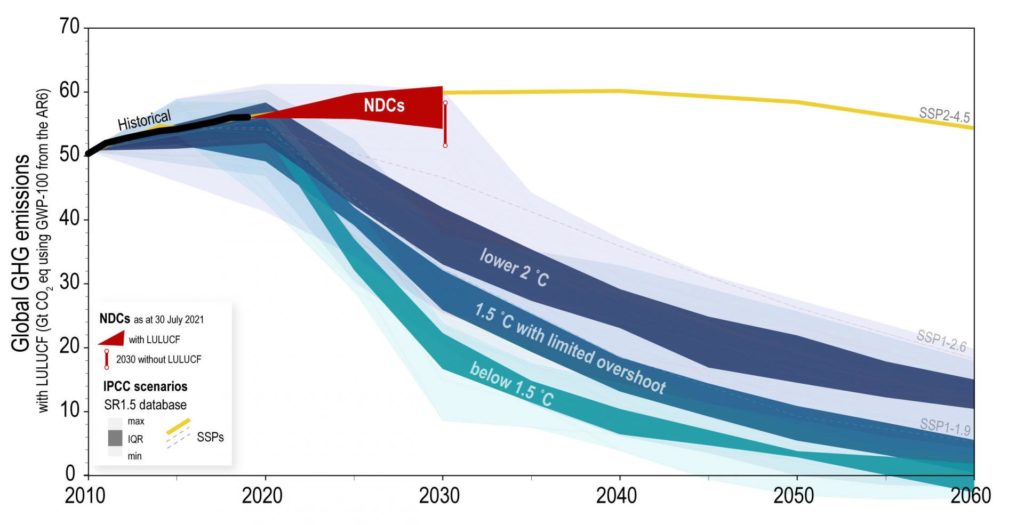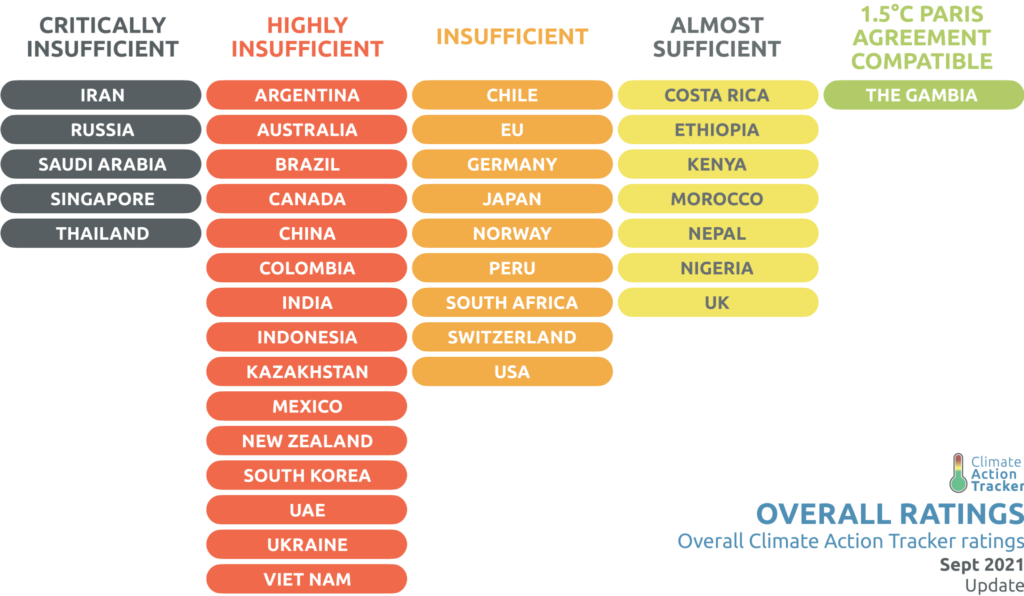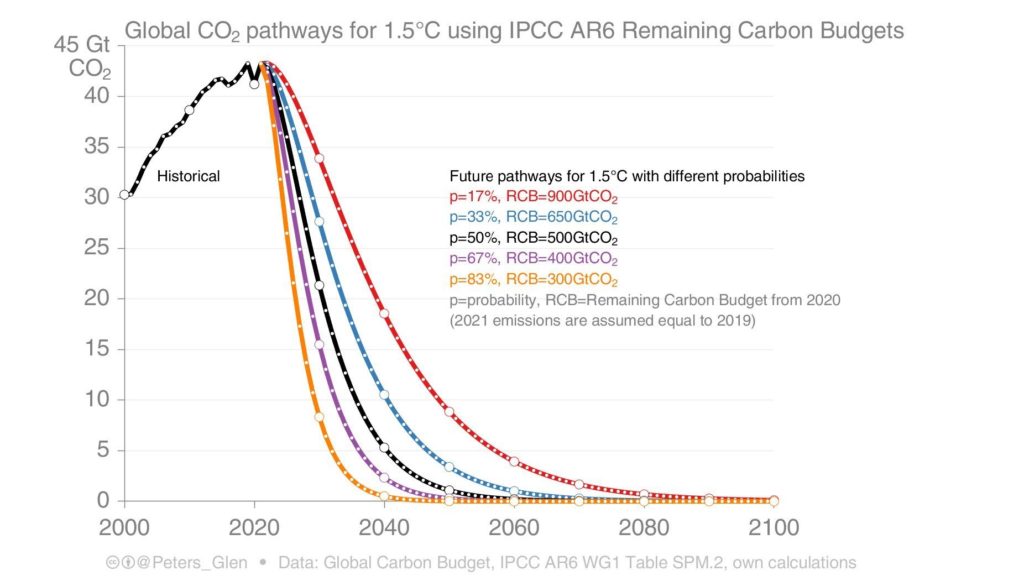Announcements of carbon neutrality in 2050 have been pouring in since the Paris Agreement. One after the other, the leaders all declare themselves “for ecology”, for a “positive ecology”, with “historic advances and unprecedented announcements” for …2050.
In ecology, as everywhere else, promises are only binding on those who believe them. Despite a summer month where we have seen one climate disaster after another, the IPCC report has only been in the news for 24 hours, and above all, daily announcements go completely against the goal of global carbon neutrality in 2050.
I had already warned about the precautions to take when you hear about carbon neutrality. When, how, on what date, on what perimeter, etc. It’s never easy to find your way around, and that’s no accident. The only thing missing is that companies and states should be transparent and that politicians could be held responsible for their climate inaction!
What would be the best way of not changing anything and at the same time saying that we are acting for the climate? Announce carbon neutrality in 2050.
Carbon neutrality in 2050… 2050 ?!!
By dint of hearing that climate change will be “very serious in 2050“, “will cause +4°C in 2100“, the collective imagination ends up believing that the danger is only for 2050. The million Malagasy suffering from famine, the dead Canadians, Germans, Belgians, Venezuelans, Japanese, New Yorkers… of the summer of 2021 alone are probably not of the same opinion. Climate change is already wreaking havoc in 2021, and will do so even more without a radical and immediate shift in our economies.
Politicians in power and business leaders have been outdoing themselves in recent years to extend Business as Usual. Each week, several of them are interviewed to announce that there is a “real awareness” but “at the same time, we are not going to change everything overnight“. As if these leaders haven’t known about the problem for 30 years. “What about the jobs?
How do you expect a politician to take into account the climate variable in his or her economic or electoral interests if in his or her mind (and in the collective imagination), climate change will only have effects in 2050? With a 5 or 6 year term, why bother. And then “man has always adapted anyway“.
Most politicians will no longer be in power or in this world, and certainly not worried about their political inaction which is already proving to be criminal. Responsible, but not guilty.
Worrying news a few weeks before the COP26
The Paris Agreement had been rightly criticized for the lack of obligations of the States to respect their objectives. No coercion or punishment. Taking the word of the States’ stated objectives (Nationally Determined Contributions, NDC), which they are obliged to update every five years, is obviously a mistake. Who today makes projects without verification or intermediate objectives? Who would not be sanctioned without achieving these goals in another setting? No one. Except the states.
Last week, the United Nations released an alarming report that highlights the delay in the effort pledged by states:
The available NDCs from all 191 parties imply a significant increase in global GHG emissions in 2030 compared to 2010, of about 16%. According to the latest IPCC findings, such an increase, if not acted upon immediately, could lead to a temperature rise of about 2.7°C by the end of the century.

Even if the United Nations will publish an update on October 25, a few weeks before the COP26 in Glasgow, the commitments are really not up to the challenge. It is further specified that “to avoid the worst climate hazards, global carbon emissions should be reduced by 45% by 2030 to limit global warming to +1.5°C. Reduce by 45%, when the promises (promises!) take you to +16%…
Always the same latecomers…
As for each COP, the negotiations take place several months in advance. No doubt that countries like Australia, China, India or Brazil have understood the interest of dragging their feet. In the eyes of their leaders, short-term profit justifies not responding to the radical change now explicitly mentioned by the United Nations.
Countries that have not declared anything, or have declared insufficient measures, are in a hurry to do so… But in the end, without obligations or sanctions, you can do whatever you want. Whatever suits you.

Meeting the climate commitments of the Paris Agreement is not looking good. Starting with article 2. Far from wanting to limit global warming to +1.5°C, our promises take us well beyond +2°C. Let’s remember once again that the difference between +1.5 and +2°C means several hundred million people will be affected. It is not me who says it, but the IPCC.
Each year, the efforts to be made become more important than the previous year. This inaction leads us to a situation where we ask the impossible of politicians and citizens, and where we ask why millions of people want to migrate.
Back to the abnormal
When you follow the climate news on a daily basis, you need to have a strong heart, a mind of steel, and above all, accept that good news is rather rare.
Many welcomed Biden’s arrival for the climate. But 2 days after the release of the IPCC report, he asked OPEC to increase oil production! World oil demand could return to its pre-pandemic level as early as next year, exceeding 100 million barrels per day again. The world beyond.
In Europe, the Germans, “true ecologists”, will run their coal plants until 2038. The Belgians are getting out of nuclear power and replacing it with gas. In the UK, a minister says that people have to keep flying to reduce their emissions (!!). In France, we have the Minister of the Environment who had the nerve to brag about doing better than the objectives of the SNBC…objectives that had been raised at the time of the SNBC2. When you can’t jump a fence, go to the side. This is also well understood by Emmanuel Macron, an advocate of carbon neutrality in 2050:

Unsurprisingly, the gold medal goes to Australia and BHP, which extends the operation of a coal mine until 2056. For carbon neutrality in 2050, we will have to go back to the drawing board.
A deadly addiction
To reach carbon neutrality in 2050, there are no 150 solutions: end our addiction to fossil fuels. Welsby & al. tell us that “to keep a 50% chance of reaching a temperature of +1.5 °C, 90% of known coal and 60% of known oil and gas must remain in the ground”. We will have to think about informing China. Xi Jinping, who had announced China’s carbon neutrality by 2060, announced on August 4 the reopening of 15 mines located in the north and west of the country.
We are completely addictedto fossil fuels. The absolute urgency, however, is to get rid of it. Even if the fossil fuel industry has the nerve to ask for billions from the States because they will lose profit. The solution is obvious: every state’s promise to achieve carbon neutrality by 2050 should be accompanied by a plan to commit to annual reductions, including in public services. All the rest is just greenwashing, discourses of climate inaction where we act as climate champions without any concrete measures behind.

Fossil fuels are transforming our world, for the better, and especially for the worse. This should neither surprise nor shock. The geopolitics of climate change is not a carefree world: everyone is there to defend their interests and their exports of raw materials. It is an open secret that some countries like Saudi Arabia (among others) are sabotaging the climate negotiations. On the other hand, we could be much more shocked by the silence of France (and the rest of the EU) during the negotiations! But what do you want, we have Rafales to sell, and if possible, submarines to sell again.
NEWSLETTER
Chaque vendredi, recevez un condensé de la semaine, des infographies, nos recos culturelles et des exclusivités.
+30 000 SONT DÉJÀ INSCRITS
Une alerte pour chaque article mis en ligne, et une lettre hebdo chaque vendredi, avec un condensé de la semaine, des infographies, nos recos culturelles et des exclusivités.
Carbon neutrality in 2050 and technological smoke and mirrors
For over 20 years, we have been promised technological innovations that will revolutionize the world and solve global warming. Obviously, for more than 20 years, no revolution in sight. Most of the innovations did not have the expected effects, sometimes even caught up by the various rebound effects.
Yet, guess what regularly makes the news? These same pseudo-advances in technology. Sometimes carbon capture, sometimes fusion… for always the same consequences: to reassure (deceive) the French, who finally will not really have to change their habits, since the production will adapt and become ‘clean’. The bad news is that we can only rely on fusion after we decarbonize our economies. So after 2050.
Net-Zero 2050: the untenable promise
There is still confusion about the terms zero emissions and net zero. What carbon neutrality aims at is indeed the net zero level: “a state of equilibrium between man-made greenhouse gas emissions and their removal from the atmosphere by man or by his actions“. This does not mean not emitting, but offsetting as much as the emissions emitted.
This means that you could potentially continue to increase greenhouse gas emissions if you found a way to offset them. This is one of the dangers of this famous carbon neutrality 2050, achieved by technological innovations or by planting trees. This type of scenario is highlighted in the Paris Agreement, and by the various IPCC scenarios, including the only one that would allow us to limit warming to +1.5°C.
This is obviously a scandal, since neither tree planting nor carbon sequestration and capture live up to their promises. This is how we end up with sorcerer’s apprentices who want to inject aerosols into the stratosphere (SAI). For your information, here is what the effort to limit warming to +1.5°C looks like, without a technological miracle:

The leaders, by refusing to act, prefer to play Russian roulette with our future and those of our children.
The supposed carbon neutrality of companies in 2050
With carbon neutrality in 2050 becoming a piece of language you can sell back to your clients/investors, it’s not surprising to see more and more companies declaring it. However, this makes no physical sense: CO2 has no borders.
It is also very interesting to look closely at the plan put in place by a company when it announces itself “carbon neutral in 2050, or even before”. Whether it is on the reduction of emissions (which very often forgets scope 3) or on compensation (with forests likely to burn, as in California), all the announcements of carbon neutrality of companies for 2 years have been greenwashing. All of them. Netflix, Nice airport, Total, etc.
The change in corporate communication strategy in the run-up to COP26 in less than two months’ time underlines the importance of being on guard. For all of them, be it the fossil fuel industry or the banks. They are very active on social media, including Linkedin, Twitter and Instagram. There is nothing like this to relieve a consumer’s expenses: “we will be carbon neutral in 2050, you can continue to consume!
The most telling recent example is certainly News Corp. After years of playing the game of climate skepticism, they are now extolling the virtues of carbon neutrality in 2050. It’s as if Manuel Valls started to take an interest in a subject: it really doesn’t smell good.
The last word
Making a promise of carbon neutrality in 2050 is of no value if it is not accompanied by a clear plan and radical short-term measures taken now to achieve it. The leaders may talk a lot, but the reality is quite different. GHG emissions have increased as soon as vaccination has been generalized (in Northern countries), leaders who are incapable of political courage and who “at the same time” increase the repression of environmental movements everywhere in the world. If you weren’t aware, an environmental activist dies every 4 days since the Paris Agreement, simply defending the little land that has not yet been exploited. Legitimate violence, huh?
Our addiction to fossil fuels must be cured and as soon as possible. Trusting only the promises of governments and companies is a mistake. Trusting the markets is a mistake. We need laws, restrictions. For some, these measures will look like punitive ecology. But the punishment is already underway: the collapse of biodiversity, a chain of climatic disasters, with damage that is already irreversible.
World leaders have a duty to do more at COP26. To do better than promises they will never keep, or to stake the future of the planet on technological promises. The moral duty not to leave an uninhabitable Earth for a part of humanity in the years to come. If most of the decision-makers will no longer be around to be judged, being able to retire other than with 50 degrees in the summer in France would not be too much.













